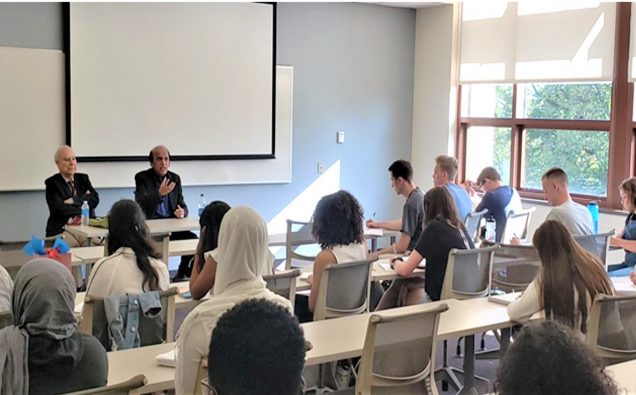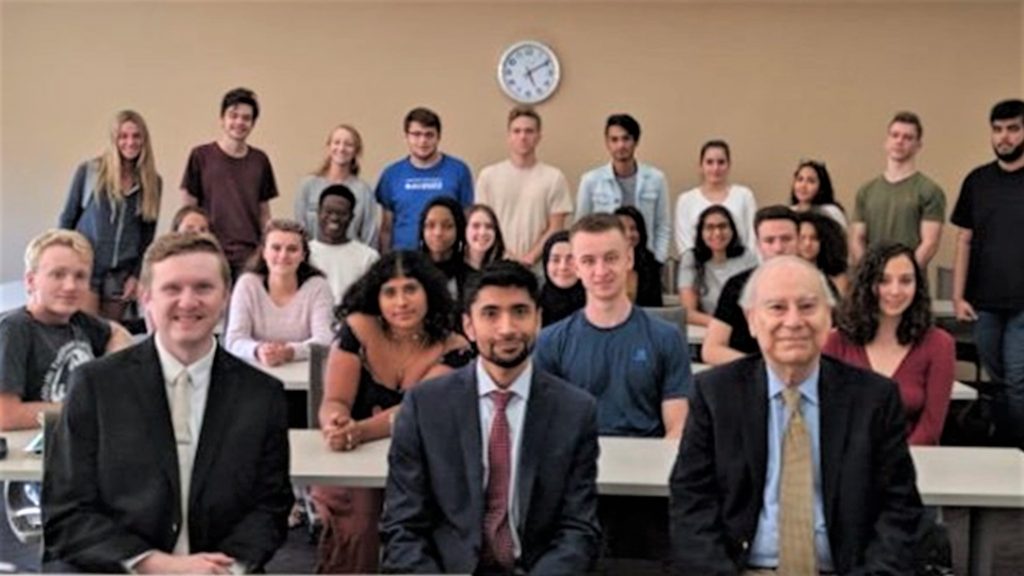
By Anjali Singh, Mayra Bokhari
What is the purpose of life? Ambassador Akbar Ahmed, former Pakistani High Commissioner and Ibn Khaldun Chair of Islamic Studies at American University, raised this question in his class World of Islam. How do Islamic scholars and others answer this question? While the question is one with a possibility of vastly different answers, the complexity breaches past philosophical perspectives.
As Ahmed’s students, we are asked to analyze these questions and promote dialogue. Ahmed stresses the importance of interfaith discourse, recognizing the efforts of notable figures such as Mahatma Gandhi and Muhammad Ali Jinnah. This influence of dialogue has been widely embraced outside of our classroom; Mowahid Hussain Shah, attorney-at-law, columnist for the Pakistan Link, and former Pakistani Cabinet Minister, spoke to our class about seeking truth in dialogue this September.
During the talk, we were reintroduced to the concept of the “clash of civilizations,” which we have discussed in class. Shah stated that, “We have tried the path of confrontation. Let’s give a chance now to reconciliation. That is a path forward in Western-Muslim relations.” He wasted no time in mentioning that we are at a pivotal age: that our generation is suffering from the backlash of the attacks that occurred on September 11th, 2001. The steps taken after these attacks has led to the rise of parochialism and negative rhetoric.
But this negative aura is not exclusive to the post 9/11 world; it has existed throughout society and can be exemplified by the conflict between India and Pakistan. Shah states that there is no such thing as a ubiquitous solution to this problem and that there are no winners at the end of the day, when fear and anger are used for violent retaliation. The clash of civilizations is not just Western-Muslim world, but also pertains to the Muslim-Hindu world.
Interfaith relations have caused burning issues of our time. As students, we stand at the forefront to the path to humanity. Leaders have paved the way for us to realize that we are on the wrong track with our understanding. Shah explained, “Islam is interwoven in the fabric of American life.” One example of the integration of Islam in American life was through Malcolm X’s story of redemption. We had the chance to hear this story, as we got the opportunity to chat with Shah on a more intimate level about these issues. In prison, Malcolm X encountered Islam and later reconciled his past thoughts, finally serving as a promoter of racial integration. His honor for others has influenced other great leaders of interfaith dialogue, such as Muhammad Ali. They all continue to have the same mantra: to continue this notion of powerful dialogue, with respect and dignity for others. This is the time to realize we are on the wrong track. We need to promote the dignity and honor of those around us, to encourage interfaith dialogue and understand others. This is the track Shah is on and he encourages us to consider it as well.
This discussion continued one week later when Ambassador Arsalan Suleman, U.S. Special Envoy to the Organization of Islamic Cooperation (OIC) came and spoke to our class. He conveyed that the United States has always been perceived as a hegemonic power and that Samuel Huntington’s framework of the “clash of civilizations” gained momentum due to the fact of its simplicity.
The blame was nowhere to be seen towards the “typical American” and the clash of civilizations became a concept exhibited through biases and media coverage. However, the so called “clash” ranging from the time prior to 9/11 to post 9/11 festered and grew into a phenomenon much larger, resulting in the idea of commonalities and shared values between Americans and the “Muslim community” to be overlooked.
Ambassador Arsalan highlighted that while topics surrounding Islam may seem like a new phenomenon, the fact is that Islam has been interwoven throughout American history in many intermingling scenarios.

U2 in Mexico City on the Vertigo tour – photo taken during the playing of Sunday Bloody Sunday Credit: Googie man at the English language Wikipedia
Examples of Islam’s thread in American tapestry dates to the first iftaar being held in the White House with President Jefferson to two copies of the Quran in his personal library. It was fascinating to see the range of the “clash of civilizations” discourse; Shah focusing on the societal and sociological aspects of the clash of civilizations while Suleman focused more on the foreign policy implications and examples.
As research students from Indian and Pakistani backgrounds, we are all part of the larger journey to intermingle, but how and who we learn this from, has a great effect on our efforts. Among the two speakers, it became even more palpable that we are living in a time of uncertainty and chaos. Intermingling among societies and a “dialogue of civilizations” is something that we have seen preached, but is it really enforced? If anything, differences should be celebrated among people, not highlighted in order to create tension and heightened polarization. The contribution to dialogue in order to cease these tensions is through education. Our biggest takeaway is that our generation plays a critical role in enforcing intermingling and true understanding and empathy among people in society regardless of race, gender, religion.
As our class expanded to incorporate guest speakers to discuss the clash of civilizations and lack of dialogue in our generation, we realized there needs to be more voices on such an important topic. If we promote dialogue, as we have learned from our class, we can reach farther, attainable goals. This is ultimately the paramount challenge of our times. The purpose of life? Make every effort to understand others so that everyone can live together comfortably.
ABOUT AUTHORS
Anjali Singh is an undergraduate student studying political science and international service at American University in Washington, D.C. Anjali hopes to continue her passion for international law and the promotion of interfaith dialogue in law school and beyond. As a young student of Islam, Anjali hopes to work on intermingling between cultures and faiths.
Mayra Bokhari is an undergraduate student studying International Studies with a minor in Management and Leadership at American University in Washington, D.C. Mayra hopes to continue further studies post-undergraduate in peace, ethics, and conflict resolution. As a young student of Islam, Mayra works to create a dialogue among people despite race, gender, religion, etc.


















